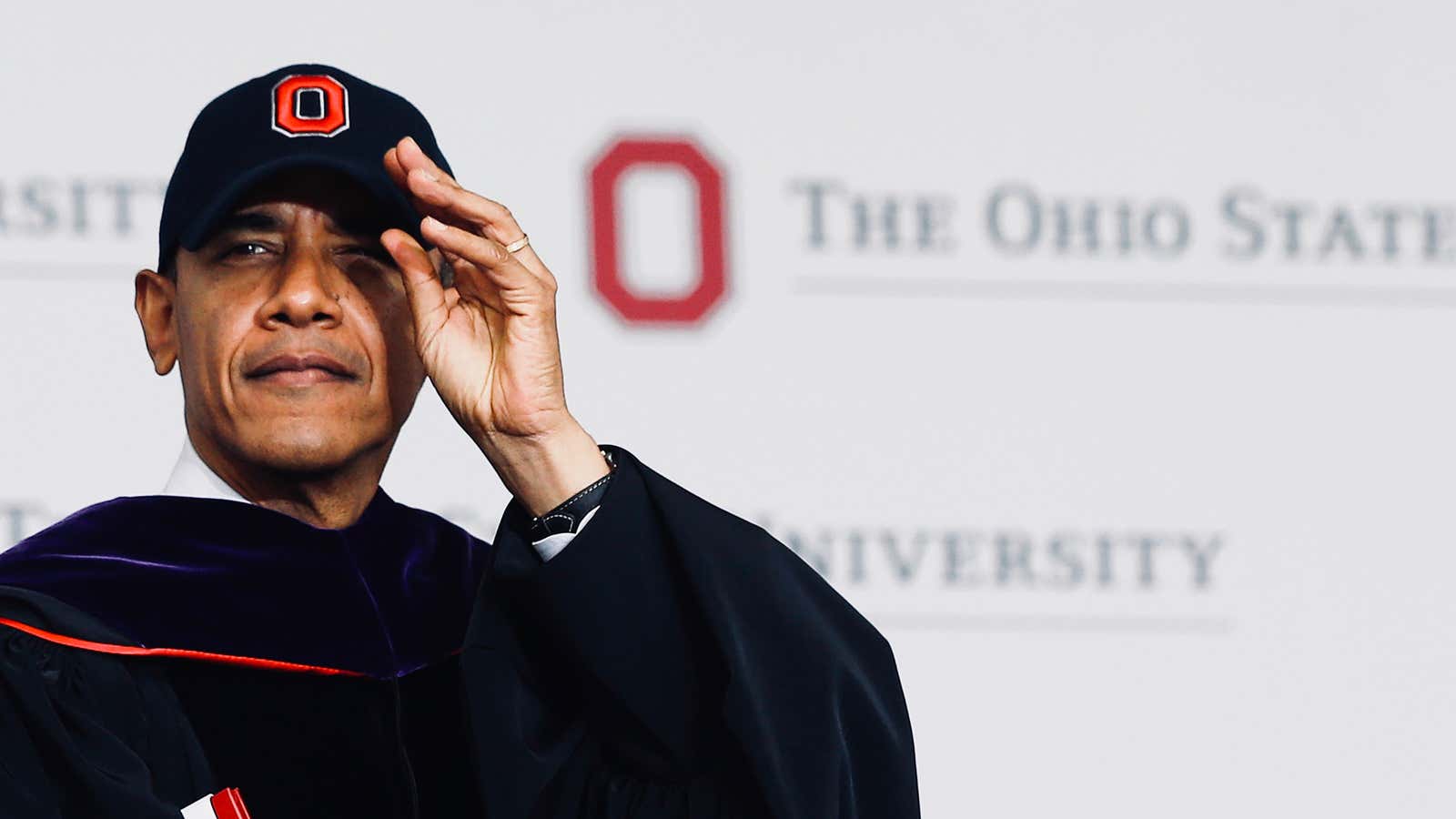It’s difficult to write a sentence without using the word “the,” yet this generic three-letter formulation is now appearing on trademark registration applications. The Ohio State University is the latest brand to seek a claim to this utterly indistinct word, but it’s not the first.
The university is, perhaps unsurprisingly, a little bit behind fashion designer Marc Jacobs. The high-end clothing brand, which isn’t a staid institution like the university, filed an application with the US Patent and Trademark Office (USPTO) to trademark “the” in May. The designer’s application got preliminary approval, but it is still under review. It will have priority over OSU, meaning that Marc Jacobs’ claim to the word, filed earlier, could delay review of the OSU application—and if Jacobs gets the trademark, OSU may have to fight the registration in order to secure protection for its own use of “the.”
In both cases, a grant of the trademark registration wouldn’t mean much to users of the English language. Even if brands can register the word, limitations on its use would only apply in specific contexts, in association with a logo or brand name, and any alleged infringements would have to be policed by the trademark holder.
Josh Gerben, a trademark lawyer, who tweeted about the university’s application, explained, ”In order for a trademark to be registered for a brand of clothing, the trademark must be used in a trademark fashion. In other words, it has to be used on tagging or labeling for the products. In this case, just putting the word ‘the’ on the front of a hat or on the front of a shirt is not sufficient trademark use.” The attorney predicts that Ohio State’s application will be rejected but suggests that the university could amend its filing so that its use of “the” in association with the university’s name or a logo might qualify for protection.
The Ohio State University spokesman Christopher Davey says the school intends to use the mark in a distinctive manner. “This only would apply for usage of ‘The’ in ways that clearly signify association with Ohio State and its brand, like for example a scarlet and grey T-shirt with ‘The’ on the front,” Davey told CNN.
So we can all still feel free to scribble this word at will in our sentences without fear of liability. However, the requests reflect a new fever for ownership.
Pop stars like Taylor Swift and Beyonce, and celebrity influencers like Kim Kardashian West, seem to have gone especially mad for marks of late. In 2015, Swift caused an uproar by seeking to register “1989,” the year of her birth, the name of an album, and a distinctive element of her brand. In fact, the mark was only associated with a specific use of the date in a certain font. Still, Swift was among the first musicians to seek ownership of common words, phrases, and dates, paving the way for others, and gaining a reputation for being fond of “ridiculous trademarks.” (Be warned—the pop star has registered the phrase “This sick beat”).
This year, Kim Kardashian West sought to register the word “kimono,” which would have been the name of her new shapewear brand. The application was met with outrage by people the world over, who believed that the reality TV star was trying to appropriate Japanese culture and stop all of us from uttering the word long associated with a particular kind of robe, or else face liability. The mayor of Kyoto even wrote to the star to ask her to reconsider her branding, and she agreed. So, there’s no more controversy over KKW’s kimonos, though confusion over trademarks persists.
As the US Patent and Trademark Office (USPTO) explains on its website: “A trademark is a word, phrase, symbol, and/or design that identifies and distinguishes the source of the goods of one party from those of others.” The thinking behind trademark protections is that they limit consumer confusion. If one brand is accused of infringing on another’s mark, the intellectual property holder policing their mark must show that use by the other is creating uncertainty in the marketplace about the goods or services offered and by whom.
Seeking ownership of everyday words is becoming more common, but those formulations don’t make for a strong mark because words like “the” aren’t unique or closely associated with any brand. In fact, even marks that once clearly were associated with a particular brand can lose their distinctiveness and thus their raison-d’etre and intellectual property protections. Kleenex and Xerox are the two best-known examples of this—once everyone started referring to all tissues as “kleenex” and using “xerox” as a verb to describe all photocopying, the brands lost their marks, which had become diluted beyond distinction.
If the USPTO ends up approving a registration for use of “the,” albeit in a specific context, it will still be up to the brand with this commonplace trademark to police its usage, which is a near impossible task. And that brand will have a difficult time convincing any court that its use of “the” has somehow become so unique and distinct that anyone else’s reliance on the word creates true marketplace confusion.
Ohio State has already run into obstacles in its ownership efforts. In 2017, the school sought to register “OSU” but ran into opposition from Oklahoma State University. Now, the two schools have an agreement stating that they can both use the acronym OSU. Presumably, however, if the USPTO ultimately approves Ohio State’s registration to trademark “the,” the school will seek to refer to itself as the one and only “The OSU.”
